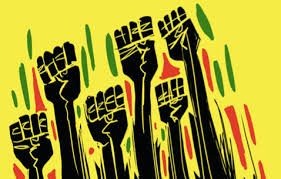
By Malcolm Suber
Over the weekend of May 18-20, 65 delegates representing more than 20 cities and states held the first National Liberation Assembly of Black anti-capitalist and anti-racist organizers.
The Assembly was the result of years of veteran revolutionary organizers observing the upsurge in the Black mass resistance struggle exemplified by the massive response to the Trayvon Martin and Mike Brown killings at the hands of white supremacists and racist police. This upsurge revealed the necessity for a well-planned country-wide response from the most advanced sections of our movement. It was concluded that serious revolutionary organizers had a duty to try and unite so that the Black Liberation Movement (BLM) could be rebuilt along sound revolutionary lines rejecting the dead-end leadership of reformist and Black capitalist forces.
Black mass struggle has broken out against police terror and police murder; for jobs and a livable wage; against the oppression of women; for housing for the homeless and affordable housing for working class families; for universal healthcare; for protection of the children and the elderly; against environmental racism; for community controlled quality education; for equal treatment of immigrant workers, for human rights for our LGBTQ brothers and sisters; and for the removal of all monuments to white supremacy.
These movements have lost their potency because they are localized and without the visibility and guidance that a country-wide revolutionary leadership could provide.
The National Assembly held workshops on the many fronts of struggle and discussed the central question of how can revolutionary fighters overcome their differences and establish a centralized organization centered in the black working class and unified in an anti-capitalist, anti-racist Black United Front.
There was a National Liberation Council elected with the authority to self-expand for inclusion for regional, gender balance, diversity and youth.
A proceedings committee was formed and charged with the task of gathering, assembling and publishing National Assembly papers for distribution, study and debate as part of the process leading to a 2nd National Liberation Assembly which will adopt a program for Black liberation.
